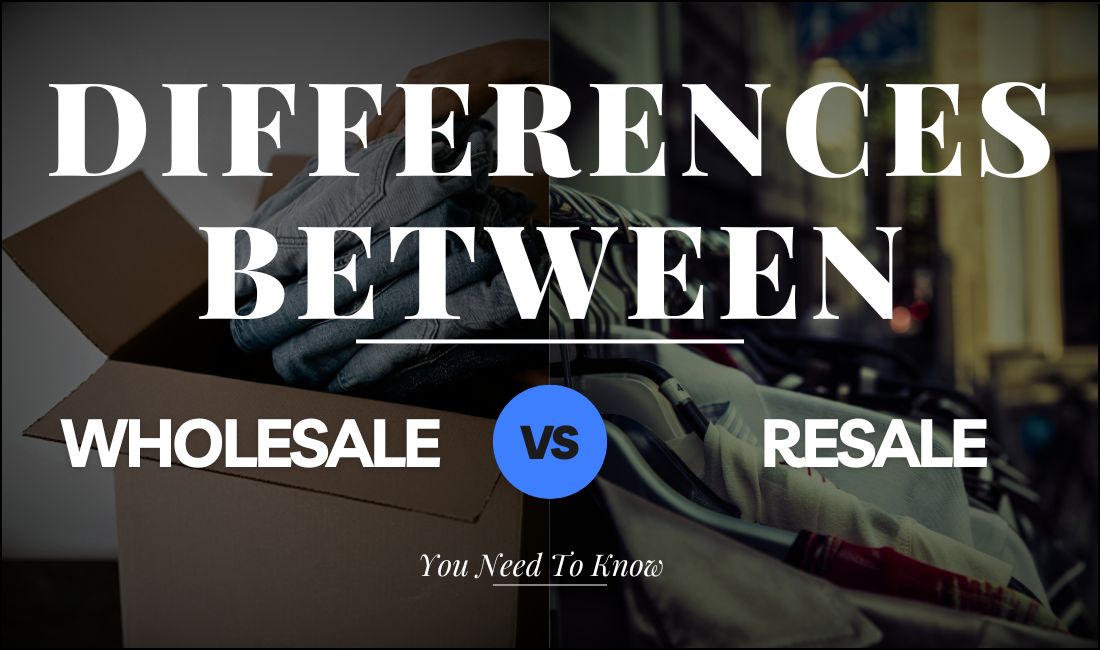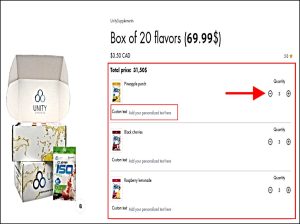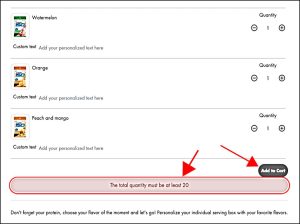
Have you ever wondered what the differences between wholesale vs. resale? It is much like the core differences between retailers and wholesalers. Both are important in the supply chain, but where they differ is where they are in the supply chain. Other than that, there are many other differences.
If you are starting a business and narrowing it down to wholesale or resale, you need to know what these differences are. Here, you can learn the differences between wholesale and retail in detail.
Wholesale Vs. Resale: How They Do Business
Wholesale and resale do business in very similar ways. Both businesses buy large quantities of products so customers can purchase a few at a time. When the customer buys the product, they pay a higher price than it was bought for. This is how both businesses gain profits.
The Wholesale Business Process
Let’s say you are a wholesaler selling light bulbs. First, you must acquire light bulbs from the manufacturers, buying 3000 at $1. You must sell these light bulbs to others at a higher price to gain profits. For your clients, you sell the light bulb at $2 a piece, and they must order a minimum quantity of 100.
The Resale Business Process
Imagine being a resale business that bought 100 light bulbs from the wholesaler. You want to resell these but of course, you want a profit from it. Instead of the wholesale price of $2, you price your light bulbs at $6. Customers come to your store after seeing your marketing of the light bulb’s energy-saving feature and buy a few. With this, you have profited a lot more than what you bought your inventory for.
So you have a basic understanding of the wholesale vs resale business process. But you can also see there are few differences between the wholesale vs. resale businesses, so let’s identify the difference between the two business model in their business process:
10 Top Differences Between Wholesale Vs. Resale
Difference#1 Business Model And Target Audience
Wholesale is a B2B business model. This means you are usually dealing with other businesses with multiple decision-makers. When marketing your products, you must consider different buyer personas to reach your target audience effectively. Wholesale companies sell in bulk to other businesses and not to end consumers.
Resale is more of a B2C business model, selling to customers who get to enjoy the end product. Resale businesses target one customer at a time and usually do not have to worry about multiple decision-makers. Resale typically has competitive prices and provides additional customer services to help customers buy the products resale businesses buy from a wholesaler.
Difference#2 Product Procurement
Wholesale procures products that they sell directly from manufacturers. When purchasing from manufacturers, a wholesaler must buy in bulk to get preferential product pricing. Some wholesalers have contracts or agreements with manufacturers to sell only a particular type of product, which the wholesaler later sells to other businesses.
Since wholesalers buy from manufacturers, resellers buy the product from the wholesaler to sell to individual customers later. The volume of a resale purchase is smaller than what wholesalers buy. Instead, resellers try to buy specific products their customers will likely buy from their stores.
Difference#3 Selling Price And Profitability
The main difference between wholesalers and resellers is the selling price of the product and how much they profit from it. Wholesalers usually buy in large quantities at lower prices. Manufacturers negotiate prices with wholesalers and give them discounts based on how much they buy. When wholesalers sell to resellers, they increase prices because resellers buy at much lower quantities. That is how wholesalers profit from their product procurement.
Meanwhile, resale businesses have a much larger profitability. Resellers put up the product at significantly marked-up prices. This is possible because customers are only buying one product at a time. Resellers have a much higher profit margin but have to be careful because their prices have to attract customers to buy them. There is little chance of negotiation because resellers must maintain the prices for profit.
Difference#4 Brand Identity And Marketing
Wholesale marketing strategy comes down to ensuring they are a reliable wholesaler providing a good user experience and brand perception to their customer base. However, once the products are in their hands, a wholesaler has little control over brand identity. The retailer selling the product handles the brand identity unless an agreement is made to keep the brand identity of the wholesaler intact when selling.
SEO also plays a major role in this process, helping resale businesses improve their online visibility and reach niche audiences. By optimizing product listings and branded content for search engines, retailers can strengthen their brand identity and drive more organic traffic.
In contrast, resale marketing creates a personal relationship between the customers and the product. Resale brand identity is all about the product and how it resonates with the brand. Since retailers sell to one customer at a time, marketing is about promoting the product to the target audience with storytelling and personalized messages.
Difference#5 Storage Locations
Wholesalers must buy in bulk to negotiate better prices, and not all products will be sold simultaneously. Therefore, the storage locations for wholesalers are significant. They have to be strategically placed so shipping and distribution are more effective. This is especially true for wholesalers who sell to other businesses in different locations. Wholesalers must understand the relationship between cash flow and inventory control to help optimize their storage location.
The same could be said for resale businesses, but they have more flexibility. Resale businesses can have storage locations near their shops, making it easy to transfer products from storage to the store shelves. However, resellers can instead go for dropshipping suppliers where they don’t have to hold physical inventory and have a distribution center handle the product storage and shipment for resale businesses with an eCommerce store.
Difference#6 Product Range
Wholesale product range can be described as quantity over diversity. Since wholesalers have to buy in large quantities, there is little scope for diversification of products. This is because wholesalers have fewer customers who require specific products.
On the other hand, retailers have to cater to a large customer base. Therefore, resellers have large product catalogs with diverse products to capture as large of a target audience as possible. Even niche resellers will opt for accessories and product variants to help diversify their product range.
Difference#7 Fulfillment Process
The wholesale fulfillment process is inflexible. They have two jobs: get the product from manufacturers and ship it to retailers. This means wholesalers send bulk shipments and proper inventory management to complete order fulfillment as efficiently as possible.
Resellers have a wide range of fulfillment processes, where resale customers are patient in receiving the product. Resellers can give fulfillment options such as same-day delivery, pickup services, free shipping, hassle-free returns, and much more. However, these services are available so resale businesses can cater to all their customers. As a result, having more options helps improve fulfillment efficiency for resale businesses.
Difference#8 Service Location
The location where the services of wholesalers have to be strategic. The offices and warehouses have to close by so there is more control over all operations. The warehouses need access to highways so they can be transferred to docks and airports to reduce the cost of shipping as much as possible.
Resale businesses need their service location to be easily accessible areas. Think of shopping malls and luxury brands on high streets. The location must align with the target audience the business wants to attract. For eCommerce, it is more flexible because the company can do business from home with the help of fulfillment centers.
Difference#9 Operational Costs
Many of a wholesaler’s operational costs are inventory storage, shipping logistics, and technology for order tracking. Expenses include warehouse rent, transportation, and staff salaries. They also invest in marketing to attract retailers. That is why there is a high cost in the initial investment of a wholesale business. After that, everything is done by inventory and order tracking, where the costs can be deferred to retailers as additional services. So overall, it is a high initial investment with a low operational cost.
Meanwhile, the resale operational cost is much higher. Much of the expenses are in storefront upkeep, rent and utility costs, salaries, marketing, and customer service. In addition, there are also costs for proper inventory management to track sales. On a day-to-day basis, the cost is much higher than in wholesale.
Difference#10 Competition
Wholesalers compete with other wholesalers, official distributors, and manufacturers’ direct-to-consumer sales. This competition is more difficult for newer wholesalers than established ones. Wholesalers have long-term vendor relationships with their suppliers due to trust and reliability. Newer wholesale businesses must enter the market by offering unique products, efficient logistics, and personalized retailer support to establish themselves.
But if you think about the resale business, the competition is much higher than wholesale. Wholesale has to deal with a limited number of competitors. However, resale has to compete with anyone selling the same product type. Competitors vary in pricing, product range, reputation, and service quality. Resale businesses aim to stand out by offering unique products and top-notch service. Competition is much steeper, which is why most small businesses in resale don’t last long.
Wholesale Vs Retail: Which Suits You Best?
Now the question is which one should you choose between wholesale vs resale. Both models have apparent benefits and challenges. Let’s consider some of them.
Considerations For Wholesale
You should go for wholesale if:
- Buy in large bulk and negotiate favorable price terms
- Streamline distribution to retailers
- Have enough storage space and inventory management know-how
- Able to build long-term B2B relationships with clients
As a wholesaler, you will need to handle large orders. You could be handling 100s if not 1000s of products at any time. You have to manage this with the manufacturers and retail clients. In addition, you have to ensure you are ordering and distributing as efficiently as possible. You must meet order fulfillment in time and assist both supply chain sides. Of course, there are risks that you have to deal with in the supply chain, such as clients not paying on time. Wholesale is right for you if you can handle these basic operations.
Considerations For Retail
For retail, you need to:
- Understand customer segment trends and market demands
- Be able to attract customers at high turnover rates
- Market a unique brand identity
- Manage high-volume transactions
Retail has you spread handling everything to ensure customers are happy and satisfied with your services. Unlike wholesale, retail businesses need you to have customers coming in constantly. Not only that, but you also need them to buy your products. To do this, you must market your business as a unique alternative to the competition to gain more customers. Moreover, you must handle a high volume of customer transactions. For eCommerce, you need to give customers multiple payment options so customers can pay however they like. If you can do these effectively, then retail is suitable for you.
Wholesale And Retail At The Same Time?
But what if you want to be a wholesaler and retailer simultaneously? It is possible to handle a retail and wholesale business at the same time. There are some considerations since you will be competing in two separate markets:
- Price products in retail accordingly so you don’t undercut your wholesale business
- Have inventory systems to manage retail and wholesale separately
- Handle both businesses simultaneously
You are competing with yourself when handling both retail and wholesale. You are both supplying your competitors and selling the same products. This means you have to price the product strategically so as not to undermine the other business. The inventory management for each company is significantly different, meaning that you have to invest in separate inventory management systems. The retail and wholesale models will increase cash influx, but you must manage them more carefully to get the best out of both.
Benefit Both Wholesale And Resale Businesses With A Bulk Order App On Shopify
Whether you want to start a wholesale or a resale business, you must have an online store. Shopify has one of the best eCommerce platforms for building your online store. In addition, there is the Shopify app store to help streamline the shopping process on your store. One such app is a bulk order mix-and-match bundle app that will help make your store unique. Here is how it will help:

Here, you can see this store, using the app, has a box bundle of 20 products where customers can choose their products. In the retail market, having such a mix-and-match bundle gives customers the choice. There is also a field where customers get to add personalized text to make the product. In wholesale, your client can choose a box that will make sense for their business, depending on demand. These choice factors increase engagement with the product page, where customers are more invested. It makes the product and shopping unique and personal to them, setting your business apart from the competition.

Another feature of this app is its minimum order quantity (MOQ) and one-click adds-to-cart features. MOQ is a vital strategy in selling products wholesale. Instead of one flavor at a time, the store can sell 20. Customers cannot add products to the cart until the MOQ restriction is met. However, once 20 flavors are added, the customer can add all of them with one click. It helps customers confirm their choices and add everything all at once. It reduces errors in ordering, and customers are likely to confirm their purchase at your online store.
Bottom Line
Wholesale and resale are all about how the business is run. Wholesale deals with other companies while in the middle of the supply chain. Resale is at the end of the supply chain, where the customers get the product. They might be different, but both businesses can be right for you. I hope reading this has helped you decide which company you want to do much more accessible.
